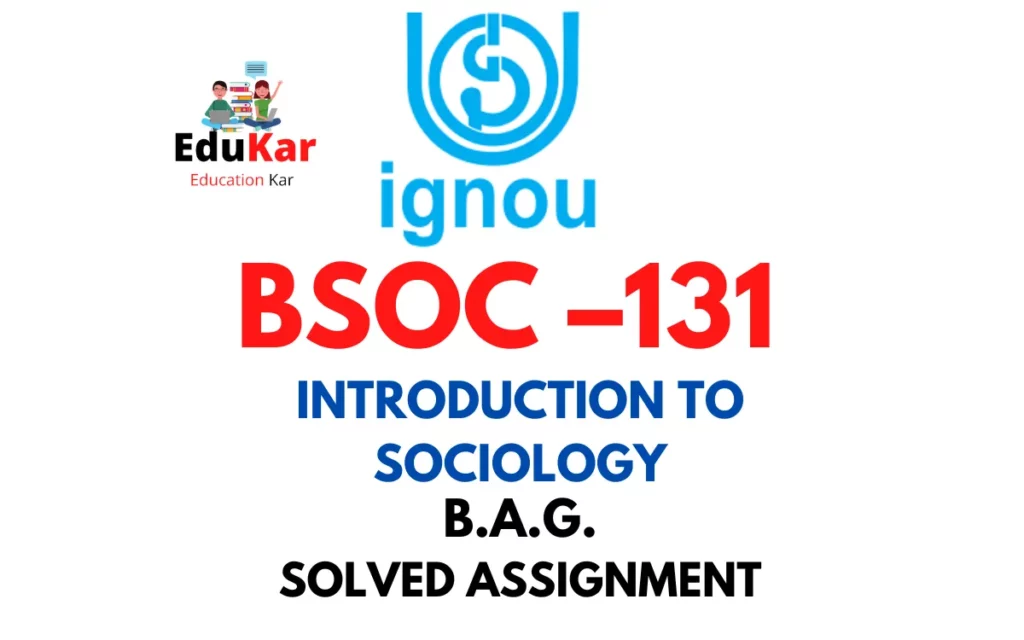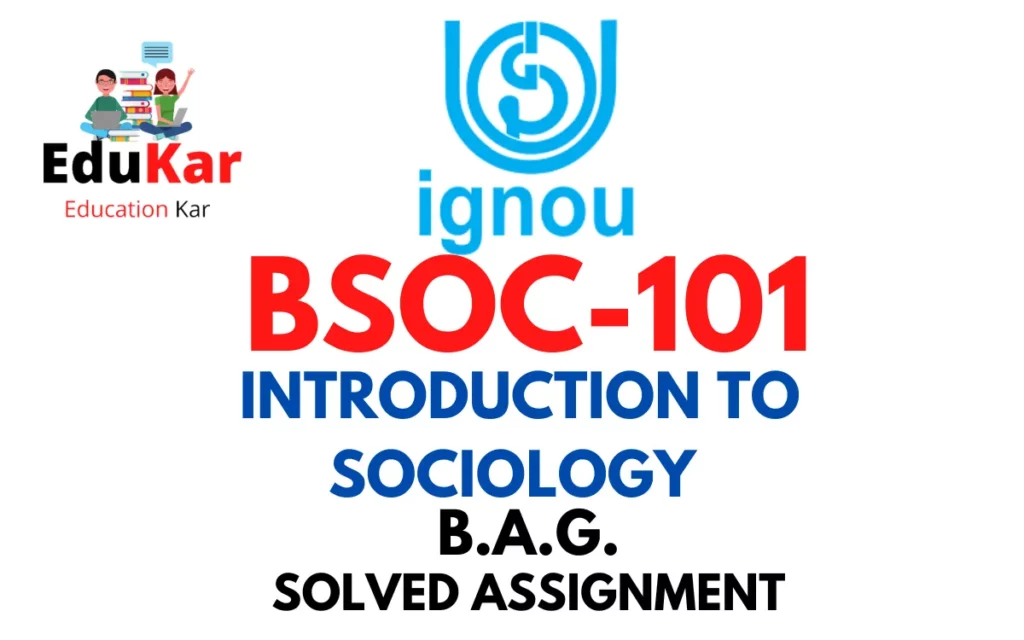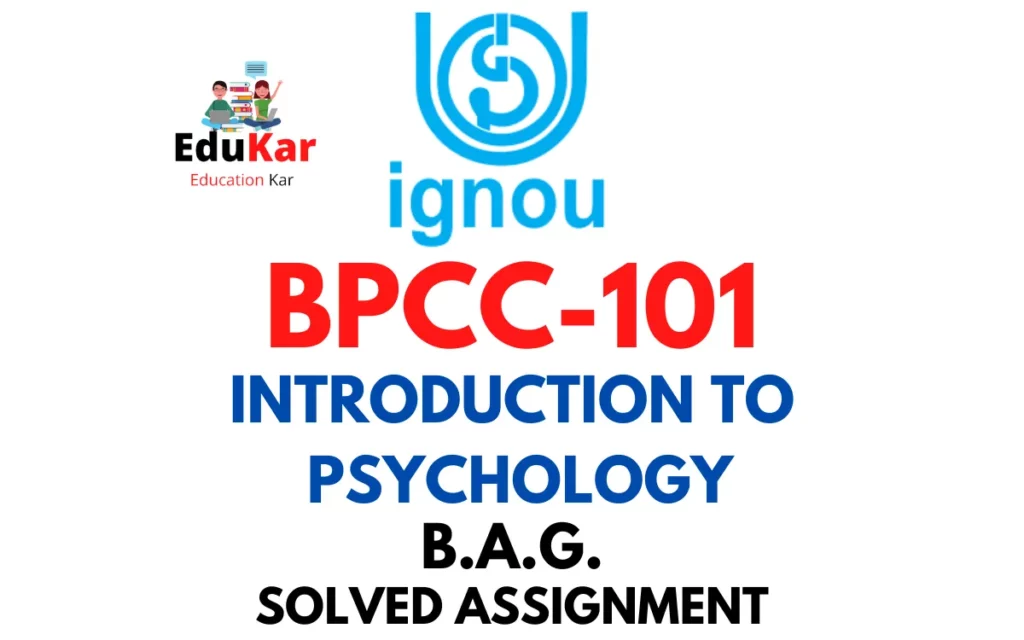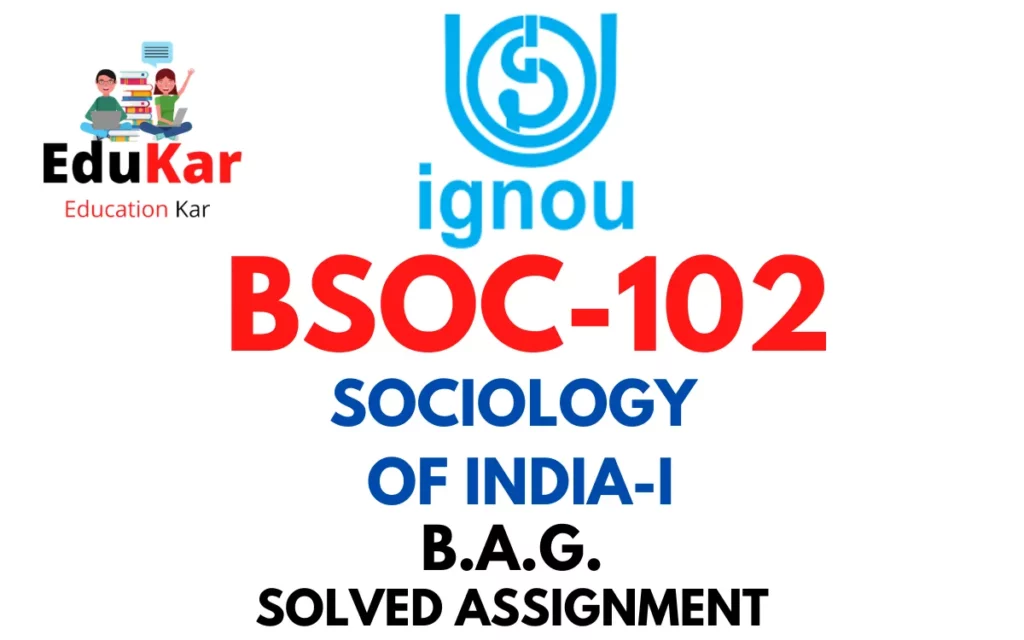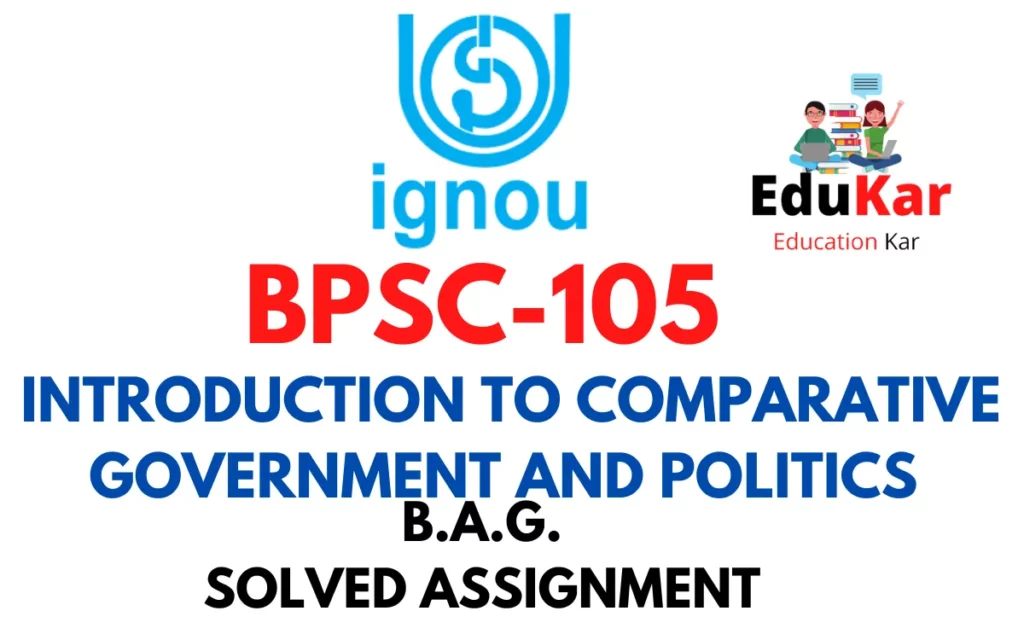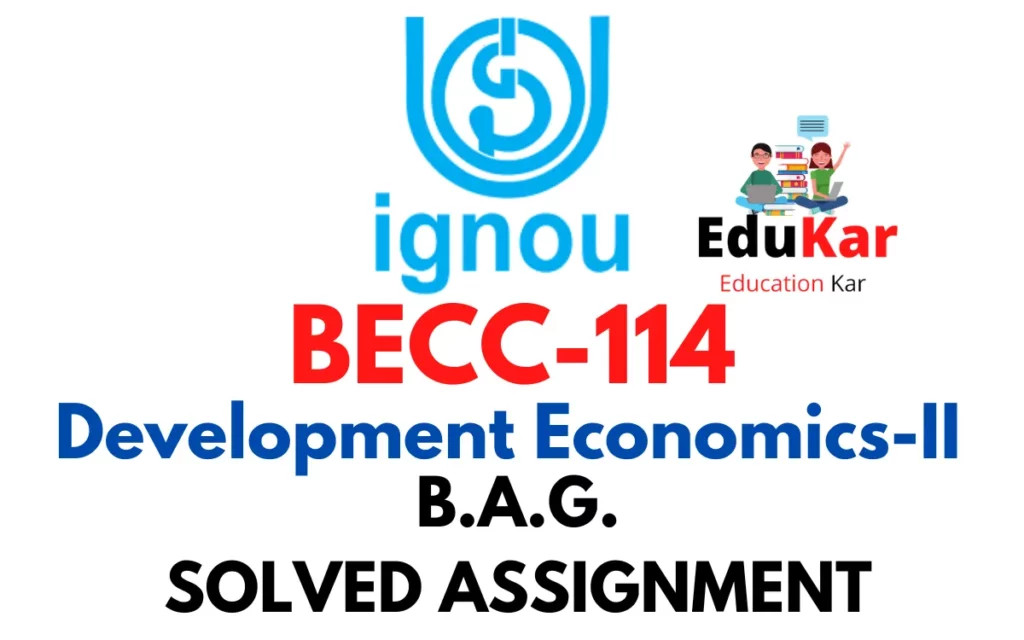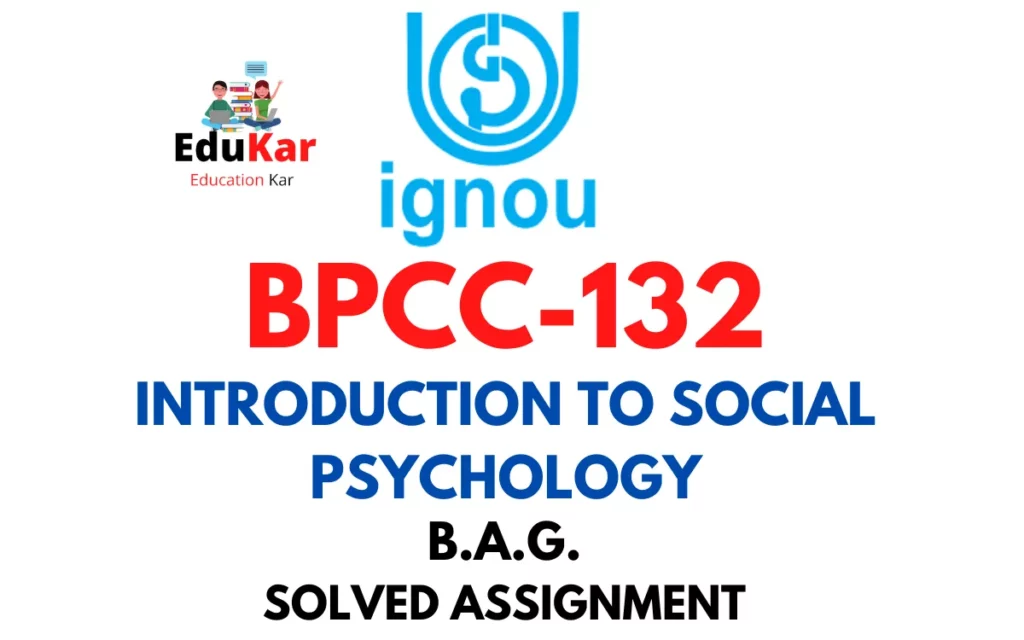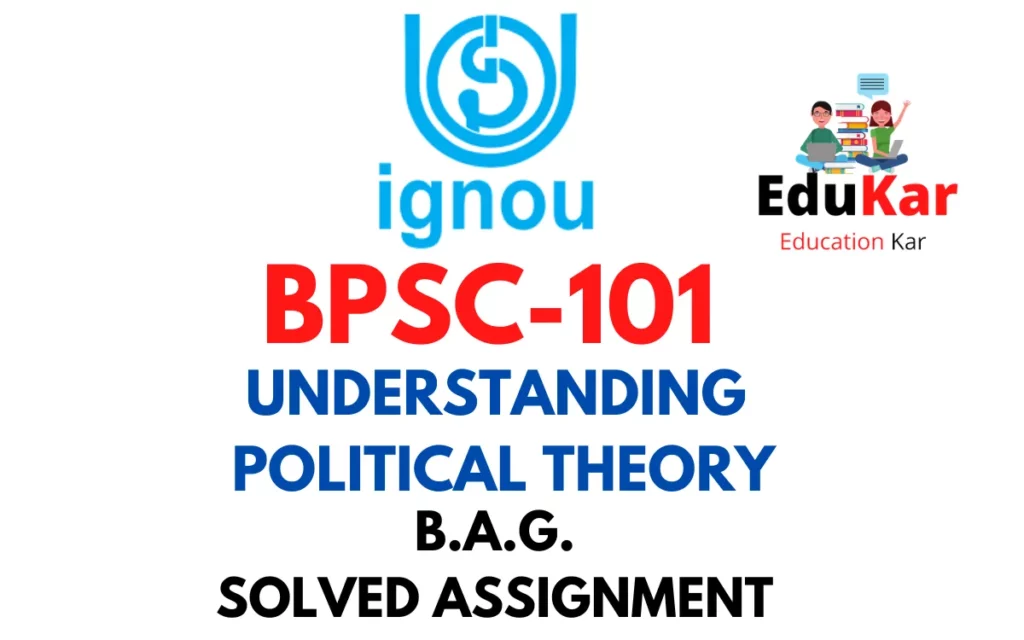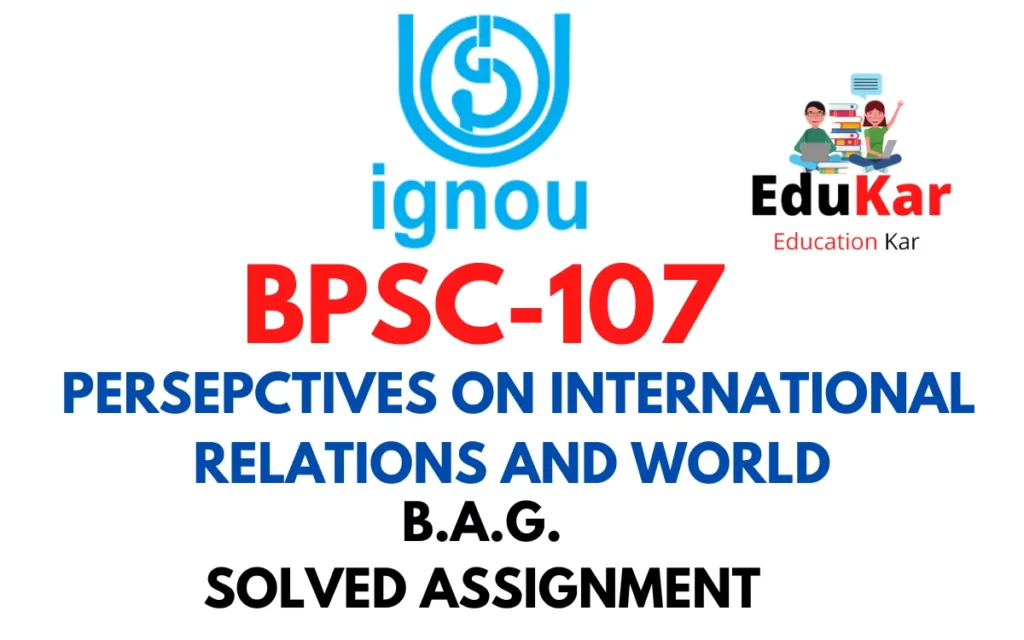Contents
- 1 Assignment – I
- 2 Answer the following in about 500 words each. Each question carries 20 marks
- 3 1. Briefly describe the modernization, dependency and statist theories that shaped studies on political development.
- 4 2. What is a political party?
- 5 Assignment – II
- 6 Answer the following questions in about 250 words each. Each question carries 10 marks.
- 7 1. Briefly describe Almond and Verba’s classification of political culture.
- 8 2. What are the reasons behind chequered democratic process in post-colonial countries?
- 9 3. Explain the dominant approaches to nation and nationalism.
- 10 Assignment – III
- 11 Write a short note on the following in about 100 words each. Each short note carries 6 marks.
- 12 1. Relative autonomy thesis
- 13 2. Decentralisation in Brazil
- 14 3. Federalism in Australia
- 15 4. Concept of popular sovereignty
- 16 5. Procedural and substantive democracy
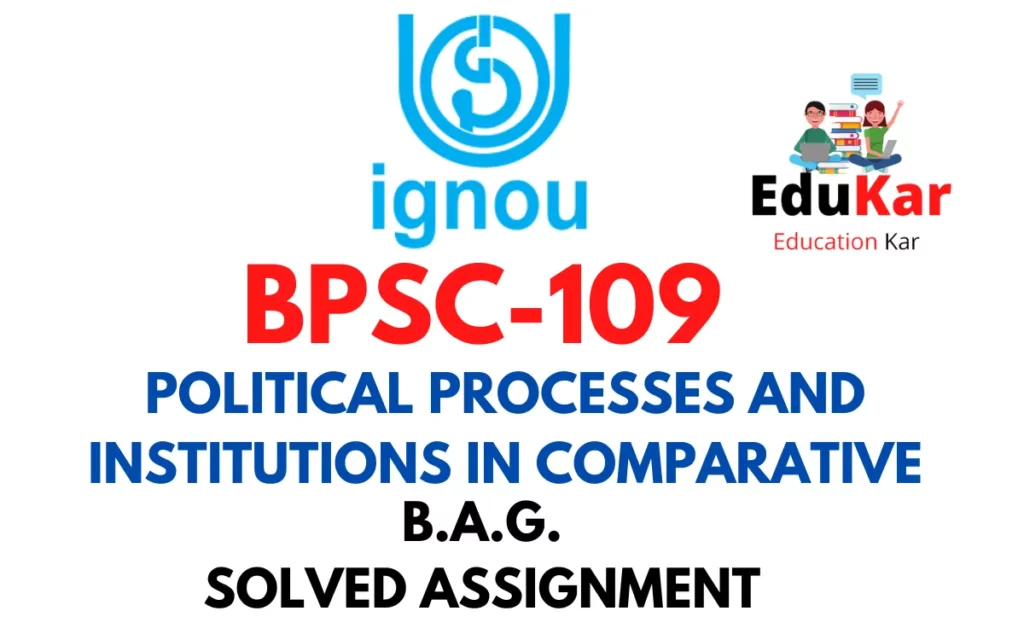
| Title | BPSC-109: IGNOU BAG Solved Assignment 2022-2023 |
| University | IGNOU |
| Degree | Bachelor Degree Programme |
| Course Code | BPSC-109 |
| Course Name | POLITICAL PROCESSES AND INSTITUTIONS IN COMPARATIVE |
| Programme Name | Bachelor of Arts (General) |
| Programme Code | BAG |
| Total Marks | 100 |
| Year | 2022-2023 |
| Language | English |
| Assignment Code | BPSC-109/ASST/TMA/2022-23 |
| Last Date for Submission of Assignment: | For June Examination: 31st April For December Examination: 30th September |
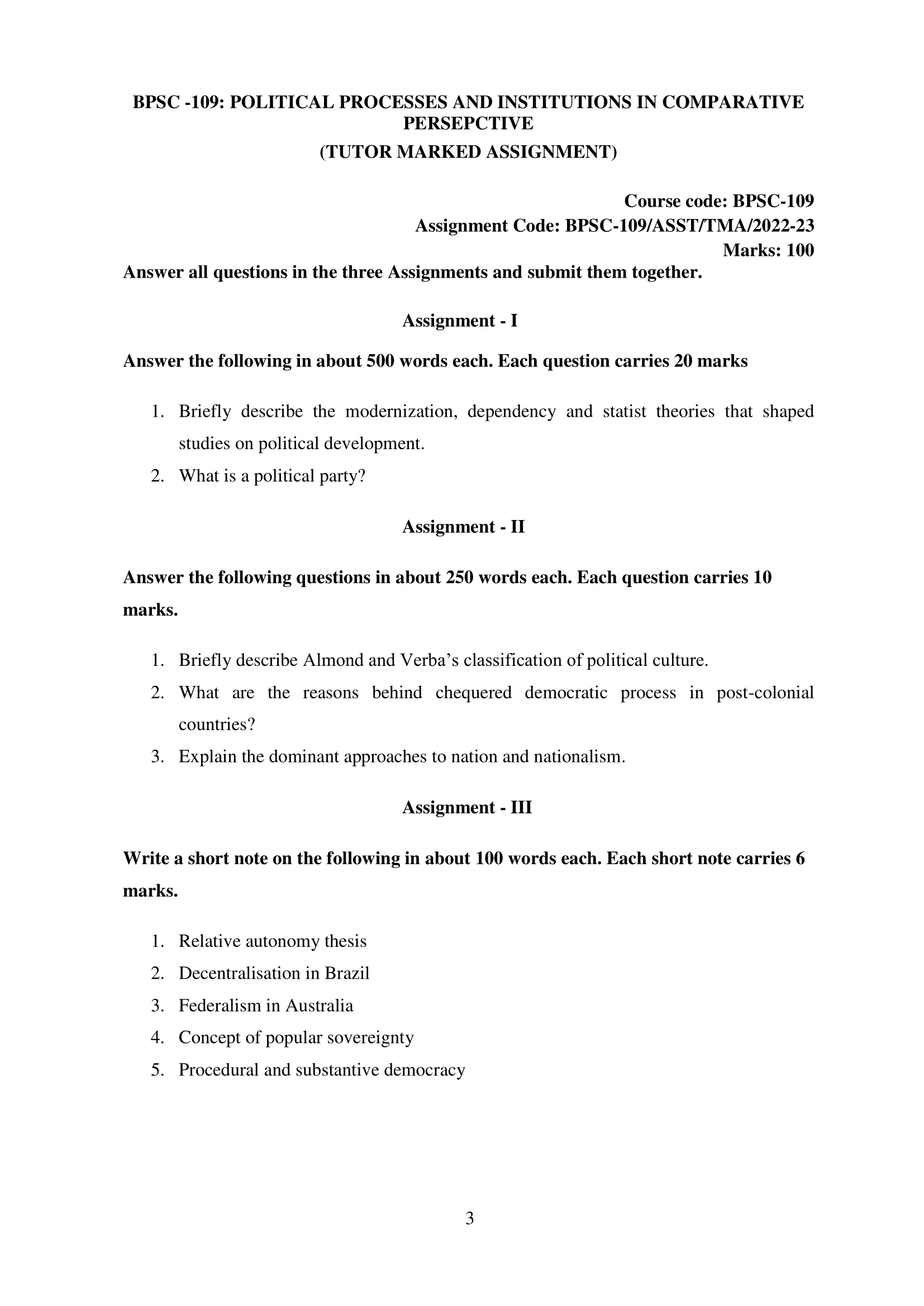
Assignment – I
Answer the following in about 500 words each. Each question carries 20 marks
1. Briefly describe the modernization, dependency and statist theories that shaped studies on political development.
Ans: The study of political development has been shaped by three major theories: modernization theory, dependency theory, and statist theory. Each of these theories provides a different perspective on how political development occurs in different parts of the world.
Modernization theory posits that political development is closely linked to economic development, with economic modernization leading to political modernization. According to this theory, societies progress through a series of stages, starting with traditional societies characterized by low levels of economic and political development, and progressing through a series of stages that culminate in modern, democratic societies. Modernization theorists argue that as a society becomes more economically developed, it will also become more politically developed, with citizens demanding more rights and freedoms and governments responding to these demands by becoming more democratic. The theory has been criticized for its assumption that all societies will follow a linear path of development, and for neglecting the cultural and historical factors that shape political development.
Dependency theory, on the other hand, suggests that political development in many developing countries has been hindered by their economic relationships with more powerful countries. According to this theory, developing countries are trapped in a state of economic dependence on developed countries, which in turn hinders their political development. Dependency theorists argue that developed countries often use their economic power to maintain political control over developing countries, and that this prevents the development of democratic institutions and political freedoms. Dependency theory has been criticized for neglecting the role of internal political and economic factors in shaping political development, and for portraying developing countries as passive victims of external forces.
Statist theory, also known as state-centered theory, emphasizes the role of the state in promoting political development. According to this theory, a strong and capable state is necessary for political development to occur, as the state is responsible for creating and enforcing the rules and institutions that govern society. Statist theorists argue that the state must play an active role in promoting economic development, as well as in creating and enforcing a legal framework that protects individual rights and freedoms. The theory has been criticized for neglecting the role of civil society and for assuming that a strong state is always beneficial for political development.
2. What is a political party?
Ans: A political party is an organized group of people who share common political goals and beliefs, and who seek to influence public policy and gain control of government through elections. Political parties are an essential component of democratic systems, as they provide a mechanism for citizens to participate in the political process and to express their preferences for government policies and leaders.
Political parties typically develop platforms that outline their policy positions and priorities, and they field candidates for elections at the local, state, and national levels. Through campaigns and electoral processes, political parties seek to mobilize support from voters and win elections, with the goal of implementing their policies and enacting their agenda once in power.
In addition to participating in electoral processes, political parties also engage in other activities such as lobbying, advocacy, and organizing social and political movements. They also serve as a mechanism for citizens to engage with and participate in the political process, providing opportunities for individuals to become politically active and to shape public policy.
Overall, political parties play a critical role in democratic societies, serving as a bridge between citizens and their governments, and providing a means for citizens to participate in the political process and influence the direction of their society.
Assignment – II
Answer the following questions in about 250 words each. Each question carries 10 marks.
1. Briefly describe Almond and Verba’s classification of political culture.
Ans: Almond and Verba’s classification of political culture proposes three types of political cultures: parochial, subject, and participant. A parochial political culture is characterized by a low level of awareness and interest in political matters, and a lack of expectations or demands from the political system. Individuals in such cultures tend to focus on their daily lives and are not actively engaged in the political process.
A subject political culture is characterized by a higher level of awareness and interest in politics, but still lacks the sense of efficacy to influence the political system. Individuals in such cultures may follow political developments and express their opinions, but they do not expect their opinions to make a significant difference.
A participant political culture is characterized by a high level of awareness and interest in politics, and a strong sense of efficacy. Individuals in such cultures are actively engaged in the political process, and they believe that their opinions and actions can make a difference. They may participate in political campaigns, vote regularly, and hold political leaders accountable for their actions.
Overall, Almond and Verba’s classification emphasizes the importance of political culture in shaping citizens’ attitudes towards politics and their level of engagement in the political process. It also suggests that political culture can vary across different societies, and that it is influenced by historical, cultural, and social factors.
2. What are the reasons behind chequered democratic process in post-colonial countries?
Ans: The post-colonial period has been marked by a chequered democratic process in many countries, characterized by a pattern of democratic transitions, authoritarianism, and political instability. There are several reasons behind this phenomenon, including:
- Weak institutions: Many post-colonial countries inherited weak institutions and governance structures that were ill-suited to the task of managing a democratic transition. This created a power vacuum that was often filled by authoritarian leaders who consolidated their power and suppressed political opposition.
- Ethnic and religious divisions: Post-colonial countries are often characterized by deep-seated ethnic and religious divisions that can lead to political fragmentation and instability. These divisions can be exacerbated by the competition for scarce resources, and by political leaders who use identity politics to mobilize their support base.
- Economic challenges: Many post-colonial countries face significant economic challenges, including poverty, inequality, and corruption. These challenges can undermine public trust in democratic institutions and create conditions that are conducive to authoritarianism.
- External interference: Post-colonial countries have often been subject to external interference from more powerful nations, including support for authoritarian leaders and covert operations to undermine democratic processes. This can lead to political instability and a lack of trust in democratic institutions.
- Incomplete decolonization: In some cases, post-colonial countries were not fully decolonized, and continued to face economic and political domination by their former colonial powers. This can create conditions that are not conducive to democratic development.
3. Explain the dominant approaches to nation and nationalism.
Ans: The concept of nation and nationalism has been a subject of scholarly debate for many years. There are several dominant approaches to understanding the nature of nation and nationalism, including:
- Primordialism: The primordialist approach views the nation as an ancient and natural phenomenon, rooted in a common ancestry, culture, or religion. This approach emphasizes the emotional and symbolic aspects of nationalism, and suggests that the nation is a deep-seated, pre-existing identity that is expressed through collective action.
- Modernism: The modernist approach views the nation as a modern construct that emerged with the rise of the modern state and industrialization. This approach emphasizes the role of political and economic factors in the development of nationalism, and suggests that the nation is a product of social and cultural processes.
- Ethnosymbolism: The ethnosymbolist approach views the nation as a product of the interplay between ethnic and symbolic factors. This approach emphasizes the importance of shared cultural symbols and myths in the formation of national identity, and suggests that the nation is a dynamic and changing entity that is continually redefined by its members.
- Constructivism: The constructivist approach views the nation as a social construction, created through the collective actions of individuals and groups. This approach emphasizes the role of discourse and power in the formation of national identity, and suggests that the nation is a contested and constantly changing entity that is shaped by political and social struggles.
Assignment – III
Write a short note on the following in about 100 words each. Each short note carries 6 marks.
1. Relative autonomy thesis
Ans: The relative autonomy thesis is a Marxist perspective that emphasizes the relative independence of the state from the dominant economic class. This perspective suggests that the state has a degree of autonomy to act in its own interests, even if those interests conflict with those of the dominant class. The state is seen as a site of political struggle, where different social groups compete for power and influence. According to this perspective, the state can act as a mediator between different classes, or as a means of resolving conflicts within a particular class. However, the state is ultimately shaped by the interests of the dominant class, and its actions are constrained by the overall structure of the capitalist system.
2. Decentralisation in Brazil
Ans: Decentralization in Brazil refers to the process of transferring political, administrative, and fiscal powers from the federal government to state and local governments. Brazil has a federal system of government, which means that power is shared between the federal government, 26 states, and more than 5,000 municipalities.
The process of decentralization began in Brazil in the 1980s, following the end of a military dictatorship, and was enshrined in the 1988 Constitution. Since then, Brazil has made significant strides in devolving power to state and local governments, and in promoting citizen participation in decision-making.
Decentralization in Brazil has been achieved through a range of mechanisms, including the transfer of financial resources to state and local governments, the creation of new political institutions, and the establishment of participatory budgeting and other forms of citizen participation. The federal government has played an important role in supporting decentralization by providing technical assistance, training, and other forms of support to state and local governments.
The benefits of decentralization in Brazil have included greater efficiency and effectiveness in the delivery of public services, greater responsiveness to local needs, and greater citizen engagement in decision-making. However, there are also challenges associated with decentralization, including the need to build capacity at the state and local level, and the risk of perpetuating regional inequalities.
3. Federalism in Australia
Ans: Federalism in Australia refers to the system of government in which power is shared between the federal government and six state and two territory governments. The Australian Constitution, which was enacted in 1901, outlines the powers and responsibilities of the federal government and the state governments.
Under the Australian federal system, the federal government has exclusive powers over a range of areas, including defence, foreign affairs, and immigration. The state and territory governments, on the other hand, have powers over areas such as education, health, and transport.
The Australian federal system is unique in that the state governments retain a significant degree of autonomy and power, compared to other federal systems such as that of the United States. The state governments are responsible for their own budgets, and have their own parliaments, which are responsible for passing laws in areas of state responsibility.
The federal government plays an important role in supporting the state governments through the provision of financial assistance and the establishment of national policies and standards. The federal government also has the power to override state laws in certain circumstances, and can use this power to ensure consistency and coherence in national policies.
The benefits of federalism in Australia include the ability to tailor policies and programs to local needs, and the promotion of regional diversity and autonomy. However, federalism can also be complex and can result in duplication or inconsistency in policy and program delivery.
4. Concept of popular sovereignty
Ans: The concept of popular sovereignty is the principle that the authority of the government is derived from the people. In a democratic system of government, popular sovereignty means that the people are the ultimate source of power and have the right to participate in the decisions that affect their lives.
The concept of popular sovereignty has its roots in the social contract theory of government, which holds that individuals voluntarily give up some of their rights and freedoms in exchange for protection and security provided by the government. According to this theory, the government is accountable to the people and derives its legitimacy from their consent.
In practice, the concept of popular sovereignty is embodied in a range of democratic institutions and processes, such as free and fair elections, referendums, and other forms of citizen participation in decision-making. These mechanisms are designed to ensure that the government is responsive to the needs and preferences of the people, and that it reflects the will of the majority.
The concept of popular sovereignty is a key element of modern democratic theory and has played a crucial role in the development of democratic institutions and practices around the world. However, it can also be a contested concept, with different interpretations and understandings of the role of the people in the political process. For example, some argue that direct democracy is the best way to ensure popular sovereignty, while others suggest that representative democracy is a more effective way to translate the will of the people into government action.
5. Procedural and substantive democracy
Ans: Procedural and substantive democracy are two different concepts used to evaluate the quality of democratic governance.
Procedural democracy refers to the formal procedures and institutions that are necessary for a democratic system to function. These may include free and fair elections, an independent judiciary, protection of civil liberties and political rights, and a free and independent press. Procedural democracy focuses on the processes and procedures that ensure that political power is exercised in a fair and transparent manner, with accountability to the public. This means that procedural democracy is concerned with the ways in which decisions are made, rather than the content of those decisions.
Substantive democracy, on the other hand, is concerned with the outcomes of the democratic process. It focuses on the policies and laws that are enacted by democratic governments, and evaluates these based on their impact on citizens and society as a whole. Substantive democracy is concerned with the content of democratic decisions, rather than the processes by which those decisions are made.
While both procedural and substantive democracy are important for evaluating the quality of democratic governance, they are not always aligned. For example, a country may hold free and fair elections and have an independent judiciary, but still fail to protect the rights and interests of certain minority groups. Similarly, a government may pass laws that are popular with the majority of citizens, but that undermine the rights or interests of certain groups in society. In such cases, there may be a tension between procedural and substantive democracy, and it may be necessary to find ways to balance the two in order to ensure that democratic governance is effective and legitimate.
How to Download BPSC-109 Solved Assignment?
You can download it from the www.edukar.in, they have a big database for all the IGNOU solved assignments.
Is the BPSC-109 Solved Assignment Free?
Yes this is absolutely free to download the solved assignment from www.edukar.in
What is the last submission date for BPSC-109 Solved Assignment?
For June Examination: 31st April, For December Examination: 30th October

